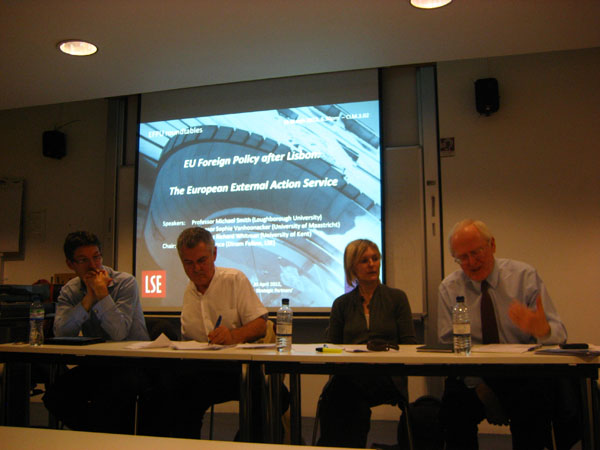 On 15 March 2012 the LSE’s European Foreign Policy Unit hosted the sixth of ten roundtables on ‘EU Foreign Policy after Lisbon’, entitled ‘The European External Action Service’. The panellists were Professor Sophie Vanhoonacker (University of Maastricht), Professor Richard Whitman (University of Kent) and Professor Michael Smith (Loughborough University). The roundtable was chaired by David Spence, Dinam Fellow at the LSE.
On 15 March 2012 the LSE’s European Foreign Policy Unit hosted the sixth of ten roundtables on ‘EU Foreign Policy after Lisbon’, entitled ‘The European External Action Service’. The panellists were Professor Sophie Vanhoonacker (University of Maastricht), Professor Richard Whitman (University of Kent) and Professor Michael Smith (Loughborough University). The roundtable was chaired by David Spence, Dinam Fellow at the LSE.
In their contributions, the panellists addressed three core questions concerning the EEAS. First, why have there been problems in the design and operation of the EEAS? Second, has the EEAS made a difference to the EU foreign policy-making, and if so, in what regard? And finally, what are the future prospects for the EEAS?
The speakers generally welcomed the set-up of the EEAS not only as a positive development in terms of establishing EU diplomacy but also as an opportunity for a more systematic and structured gathering and processing of information. While Professor Whitman praised the EEAS for its uniqueness, the panellists agreed that there is a wide gap between the expectations and capabilities of the EEAS.

Referring to the problems in the design and operation of the EEAS, the speakers argued that the EEAS has to overcome several major difficulties. First, the problem of reconciling the different organisational and working cultures of its staff. The EEAS brings together officials from different administrative and institutional backgrounds such as the European Commission, the Council Secretariat and the diplomatic services of the member states. According to Professor Vanhoonacker, the diverse organisational and working cultures could impede cooperation among the officials working for the EEAS. Second, EU foreign policy continues to be intergovernmental with member states as the key decision-takers who differ in their views and expectations of the EEAS. Whereas small EU member states see the EEAS as an opportunity to increase their presence in the world and at the same time to relieve their own over-stretched services, big member states are rather sceptical about the EEAS. As a consequence they are very reluctant to significantly contribute to it in terms of staff and resources. Finally Professor Smith referred to the importance of ‘strategic diplomacy’ on which European diplomacy should be based. ‘Strategic European diplomacy’ implies the development of a coordinated and coherent diplomacy in the EU’s relations with its strategic partners. Although the primary intention behind the creation of the EEAS was the strategic projection of European diplomacy, according to Smith, the EEAS for the time being lacks the necessary prerequisites for the management of strategic diplomacy such as a stable institutional base, financial and political resources, and a ‘strategic narrative’.
With regard to the implications of the EEAS for the EU foreign policy-making process, the speakers were in agreement that with the EEAS the number of actors involved in EU external policy-making has increased and so has the complexity of the policy-making process. The creation of the EEAS has revealed the often highly problematic interaction between the Union’s High Representative heading the EEAS and other EU institutions/actors such as the Commission or the Council Presidency. The interaction with the Commission has proved difficult particularly in areas of shared competence such as development cooperation where the role of the High Representative in relation to the Commissioner for Development Cooperation remains unclear. Development cooperation also provides a good example of the complex interaction between the Council Presidency and the High Representative who chairs the Foreign Affairs Council on development. As a consequence, Professor Vanhoonacker argued that while the abolition of the rotating Presidency in CFSP was supposed to bring more coherence in the EU’s external action, it had the opposite effect, with different EU actors chairing and representing the EU at different levels.
In their final assessments of the future prospects for the EEAS, the speakers agreed that the value of the EEAS for the EU’s foreign policy would largely depend on its financial and political resources as well as the quality of its staff. Moreover, Professor Whitman defined three main difficulties which the EEAS will have to overcome in the future, including the strategy challenge, the leadership challenge and the delivery challenge. In order to meet the strategy challenge, the EEAS has to take account of the recent trends in 21st century diplomacy such as the ongoing shifts in the redistribution of global and economic power, the increasing diversity of diplomatic actors culminating in a ‘multi-stakeholder diplomacy’ as well as the changing role of national diplomatic services. Meeting the leadership challenge could be particularly difficult for the EEAS when dealing with countries which have a traditional, state-centric approach to diplomacy. Finally, the wide gap between the EEAS’s duties and resources poses a serious delivery challenge for the EEAS.
The speakers came to the conclusion that, while it would be inadequate to regard the EEAS as a ‘new kid on the block’ since it has been in the making for almost a decade, it is a sui generis service that still needs to find its role and place in the EU’s institutional structure.
Monika Hellmeyer, PhD Candidate, Department of International Relations, LSE


